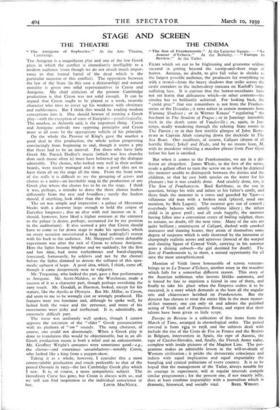STAGE AND SCREEN
THE THEATRE
"The Antigone of Sophoetes." At the Arts Theatre, Cambridge.
THE Antigone is a magnificent play and one of the few Greek plays in which the conflict is immediately intelligible to a modem audience (even though we do not attach much impor- tance to that formal burial of the dead which is the particular occasion of this conflict). The opposition between the law of the State (in this case a dictatorship) and natural morality is given two solid representatives in Creon and Antigone. My chief criticism of the present Cambridge production is that Creon was not solid enough. It can be argued that Creon ought to be played as a weak, neurotic character who tries to cover up his weakness with obstinacy and ruthlessness. But I think this would be reading modem conceptions into it. One should beware of treating a Greek play—with the exception of some of Euripides—psychologically.
The muthos, as Aristotle said, is the important thing. Creon and Antigone embody two opposing principles and Creon must at all costs be the appropriate vehicle of his principle. On the whole the Provost of King's gave the muthos a good deal in this production, the whole action progressing convincingly from beginning to end, though it seems a pity that there had to be an interval. For those who have little Greek Mr. Patrick Hadley's music (which was less churchy than such music often is) must have bolstered up the dialogue admirably. The chorus, who looked very well in their archaic beards, were nicely managed and it was a good idea not to have them all on the stage all the time. From the front rows of the stalls it is difficult to see the grouping of actors and chorus as a unity—an inevitable snag in the production of any Greek play where the chorus has to be on the stage. I think it was, perhaps, a mistake to dress the three chorus leaders differently from the rest and beardless ; surely the leaders should, if anything, look older than the rest.
The set was simple and impressive : a palace of Mycenean blocks with a doorway large enough to hold the corpse of Eurydice longways ; also an altar with real incense on it. I should, however, have liked a higher rostrum at the entrance to the palace (a desire, perhaps, accounted for by my position in the auditorium). It also seemed a pity that Creon should have to come so far down stage to make his speeches, which on every occasion necessitated a long (and unkingly?) retreat with his back to the audience. Mr. Sheppard's most debatable experiment was after the exit of Creon to release Antigone. Here the lights became brighter and we suddenly, for the first and last time, had some eurhythmics and hand-clapping (executed, fortunately, by soldiers and not by the chorus) before the lights dimmed to denote the collapse of this spas- modic upburst of hope. A good idea, which, I think, came off, though it came dangerously near to vulgarity.
Mr. Tregoning, who looked the part, gave a fine performance as Antigone. Mr. Scott-Malden, as the Watchman, made a success of it as a character part, though perhaps overdoing the zany touch. Mr. Goodall, as Haemon, looked, except for his stature, like the Apollo at Olympia. But Mr. Millar, as Creon, did seem to me to be wrongly cast or wrongly produced. His features were too feminine and, although he spoke well, he lacked both the voice and the presence, and many of his movements were jerky and ineffectual. It is, admittedly, an extremely difficult part.
The verse was uniformly well spoken, though I cannot approve the retention of the " older " Greek pronunciation with its plethora of " ow " sounds. The sung choruses, of course, one could not disentangle. When a Greek play is done in translation this would be objectionable, but in an all- Greek production music is both a relief and an enhancement. Mr. Geoffrey Wright's costumes were sometimes good--e.g., the chorus—and sometimes unsatisfactory—notably Creon, who looked like a king from a puppet-show.
Taking it as a whole, however, I consider this a most commendable production and much preferable to that of the potted Oresteia in 1933—the last Cambridge Greek play which I saw. It is, of course, a more sympathetic subject. The Hereditary Curse has gone, but Creon is always with us, and wz still can find inspiration in the individual conscience at










































 Previous page
Previous page